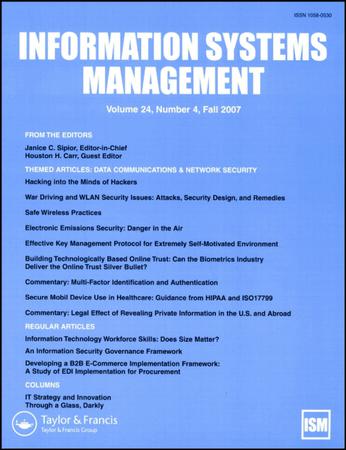来自编辑
IF 3.9
3区 管理学
Q2 COMPUTER SCIENCE, INFORMATION SYSTEMS
引用次数: 0
摘要
欢迎收看第40卷第2期。本期包括五篇文章。Jordana J.George、Jie Yan、Dorothy E.Leidner和Pranjal Awasthi的第一篇文章题为“从事数据慈善活动会影响商业价值吗?”,探讨了数据慈善活动对金融市场决定的商业价值的影响。结果表明,大规模数据协作带来了全球效益。然而,与预期相反,当数据开放性或合作伙伴数量增加时,数据慈善参与要么没有产生影响,要么产生负面影响。Moksh Matta、Hasan Cavusoglu和Izak Benbasat在他们的文章《理解董事会参与信息技术治理》中提出了一个描述董事会参与IT治理的统一分析理论。该框架揭示并正式化了董事会作为领域和公司特定IT知识聚合者的作用。在题为“信息技术治理如何影响组织敏捷性:市场动荡的作用”的第三篇文章中,作者Moustafa Elazary、AlešPopovič、Paulo Henrique de Souza Bermejo和Tiago Oliveira通过将基于资源的观点扩展为动态能力的观点,捕捉了IT治理与组织敏捷性之间的关系。他们的模型通过对高级管理人员的调查进行了测试,发现IT能力和创新能力完全中介了IT治理对组织敏捷性的影响。接下来,作者Klaudia Martinek Jaguszewska和Waldemar Rogowski在他们的文章《业务流程自动化成熟度模型的开发和验证:Delphi研究的结果》中创建了一个业务流程自动化的成熟度模型。新的成熟度模型由10名独立领域专家组成的Delphi小组进行了验证。最后,在五篇文章的最后一篇,题为“移动银行服务中信任促进信息的前因和调节者:一个精化的可能性模型视角”,作者Kinana Jammoul,Habin Lee,Jisun Kim,Moongil Yoon,和Uthayasankar Sivarajah确定接收者如何解读来自移动银行服务的通信消息,以增加他们对移动银行的信任。一项针对手机银行用户的调查发现,沟通的论据质量和可信度都对手机银行服务的信任有积极影响。此外,有强烈隐私和安全问题的用户更有可能依赖消息中论据的质量。ISM网站上提供了提交的详细信息:http://www.tandfonline.com/uism欢迎通过ScholarOne的ISM手稿中心提交意见,网址:http://mc.manuscriptcentral.com/uism我鼓励你考虑出版《信息系统管理》杂志来发表你的质量研究。我还邀请你考虑一下客座编辑一期特刊的问题。一如既往,我非常感谢你们,我们忠实的读者群,感谢资深编辑在监督投稿方面的专业知识,感谢作者进行了出色的研究,感谢众多评论家为作者提供了富有洞察力的评论和建议。本文章由计算机程序翻译,如有差异,请以英文原文为准。
From the Editor
Welcome to the second issue of Volume 40. This issue includes five articles. The first article, entitled “Does Engaging in Data Philanthropy Impact Business Value?” by Jordana J. George, Jie Yan, Dorothy E. Leidner, and Pranjal Awasthi, examines the impact of data philanthropy activities on business value as determined by financial markets. The results show that large scale data collaboratives resulted in global benefits. However, contrary to expectations, data philanthropy participation either produced no impact or a negative impact when data openness or the number of partners increased. A unifying analytical theory describing the board of director’s involvement in IT governance is proposed by Moksh Matta, Hasan Cavusoglu, and Izak Benbasat in their article “Understanding the Board’s Involvement in Information Technology Governance.” This framework uncovers and formalizes the role of the board as aggregator of domainand firm-specific IT knowledge. In the third article entitled, “How Information Technology Governance Influences Organizational Agility: The Role of Market Turbulence,” authors Moustafa Elazhary, Aleš Popovič, Paulo Henrique de Souza Bermejo, and Tiago Oliveira capture the relationship between IT governance and organizational agility by extending the resource-based view with the dynamic capabilities view. Their model was tested with a survey of senior managers, revealing that IT capability and innovation capability fully mediate the effect of IT governance on organizational agility. Next, authors Klaudia Martinek-Jaguszewska and Waldemar Rogowski create a Business Process Automation Maturity Model in their article, “Development and validation of the Business Process Automation Maturity Model: Results of the Delphi study.” The new maturity model was validated with a Delphi panel comprised of 10 independent domain experts. Finally, in the last of the five articles, entitled “Antecedents and Moderators of Promotion Messages for Trust in Mobile Banking Services: An Elaboration Likelihood Model Perspective,” authors Kinana Jammoul, Habin Lee, Jisun Kim, Moongil Yoon, and Uthayasankar Sivarajah determine how communication messages from mobile banking services are interpreted by receivers to increase their trust in mobile banking. A survey of mobile banking users found that both argument quality and trustworthiness of the communication had positive effects on trust in mobile banking services. Further, users with strong privacy and security concerns are more likely to rely on the quality of arguments in the messages. Submission details are presented on the ISM website: http://www.tandfonline.com/uism Submissions are welcome through ScholarOne’s Manuscript Central for ISM at: http://mc.manuscriptcentral.com/uism I encourage you to consider the Information Systems Management journal for publication of your quality research. I also invite you to think about guest editing a special issue. As always, I am deeply grateful to you, our devoted readership, the Senior Editors for their expertise in overseeing submissions, the authors for undertaking excellent research, and the many reviewers for imparting insightful comments and suggestions to authors.
求助全文
通过发布文献求助,成功后即可免费获取论文全文。
去求助
来源期刊

Information Systems Management
工程技术-计算机:信息系统
CiteScore
14.60
自引率
1.60%
发文量
20
审稿时长
>12 weeks
期刊介绍:
Information Systems Management (ISM) is the on-going exchange of academic research, best practices, and insights based on managerial experience. The journal’s goal is to advance the practice of information systems management through this exchange.
To meet this goal, ISM features themed papers examining a particular topic. In addition to themed papers, the journal regularly publishes on the following topics in IS management.
Achieving Strategic IT Alignment and Capabilities
IT Governance
CIO and IT Leadership Roles
IT Sourcing
Planning and Managing an Enterprise Infrastructure
IT Security
Selecting and Delivering Application Solutions
Portfolio Management
Managing Complex IT Projects
E-Business Technologies
Supporting Knowledge Work
The target readership includes both academics and practitioners. Hence, submissions integrating research and practice, and providing implications for both, are encouraged.
 求助内容:
求助内容: 应助结果提醒方式:
应助结果提醒方式:


